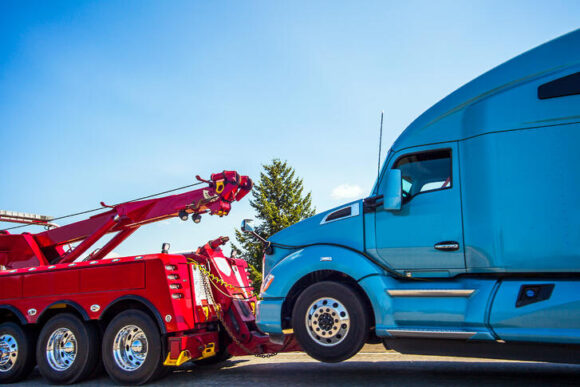
This post is part of a series sponsored by IAT Insurance Group.
Companies that engage in disreputable towing — sometimes referred to as predatory towing — practices are preying on trucks in areas known to have an elevated frequency of crashes. They may even use nefarious means to contribute to likelihood of an accident. This is the latest scam affecting long haul and moving and storage trucking.
Case in point: A driver recently incurred significant damage when attempting to drive their tractor trailer under a Chicago bridge, whose “low bridge” sign had been suspiciously removed. As soon as the accident happened, an unsolicited tow truck appeared. In the driver’s distress and haste to rectify the situation as quickly as possible, the driver accepted towing services without a quote. Soon after, the moving and storage company received a bill for the $75,000 towing, a service that should have cost around $2,500.[1]
While predatory towing scams like this and others are occurring around the country and raising concerns amongst fleets,[2] they have been particularly prominent in Chicago. So much so that Chicago’s City Council’s Committee on License and Consumer Protection passed an ordinance calling on the city to establish a license for tow truck operators to corral rogue tow truck drivers who rush to accident scenes, snare damaged vehicles and hold them hostage until rattled truckers pay exorbitant fees.[3]
7 Best practices for fleet carriers
Fleets and truckers must protect themselves against tow truck companies that run illegal or unethical operations. The following best practices offer key guidance for your fleet.
- Plan your routes. Don’t let your truckers wing it when they are picking up goods or hauling a load. Proper route planning will not only ensure safety and increase driving efficiency by avoiding both known and unknown hazards but will also incorporate breaks and help determine the best route depending on what time of day a trucker is on the road. Digital route planning tools are available to help with this as well.[4]
- Be suspicious. Towing companies standing by on the scene when an incident occurs is not the norm. Train your drivers to be on the lookout for scamming tow trucks waiting in the wings. Prepare your drivers before an accident takes place to alleviate unnecessary stress; inform them that they may not be responsible for the underpass they just clipped if the low bridge sign was illegally removed, for example. That information should help them think more clearly in these situations.
- Call the police. Summon them to the scene and request an accident report. If this does happen to you or one of your drivers, ask local police at the scene for guidance on selecting reputable, local towing company.
- Get it in writing. Make sure the cost of a tow is in writing — not open-ended — with all charges clearly itemized. Avoid verbal agreements at all costs. Signed documents with clear cost pricing is essential to protecting the fleet from being scammed. Ask for the towing company’s business license and, if possible, confirm the information before accepting any assistance.
- Have protocols in place for dealing with accidents. This includes contacting managers and dispatchers right away, calling the police and preventing drivers from signing or authorizing a tow without management approval. Providing drivers clear protocols beforehand significantly reduces the probability of making a mistake when a tow is required.
- Consider partnering with towing companies. Establishing agreements with national or local towing companies where your fleet frequents can help your organization sidestep dishonest tow trucks. With such agreements already in place, truckers can immediately contact these companies, avoiding the need to source one on the spot.
- Report to local officials. If your driver or fleet falls prey to a shady towing incident, reach out to local officials for support. Reporting all of these incidents will help local jurisdictions take regulatory action to prevent this from happening again, as they did in Chicago.
Towing costs
Even with all these precautions in place, towing is expensive. Factors like the weight and size of the truck and the distance to be towed legitimately impact the price. Consequently, fleets should also not assume they are dealing with a nefarious towing company if they are looking at an expensive quote.
Due to the rise in these scenarios, the American Transportation Research Institute is asking motor carriers and drivers to participate in data collection on the impact of predatory towing. Find the link to the short survey here.
ASK AN LCR
Have a question on how to mitigate risk? Email [email protected] for a chance to see your question answered in a future blog.
By Chris Parker
[1] Costhack “How Much Does It Cost To Tow A Semi-Truck?”
[2] American Trucking Associations “The American Trucking Association, American Property Casualty Insurance Association, & the Coalition Against Insurance Fraud join forces to tackle towing fraud across America,” April 5, 2021.
[3] Chicago Sun-Times “Aldermen endorse effort to corral ‘Wild West’ of rogue tow truck drivers,” May 19, 2021.
[4] FreightWaves “Route planning tool helps drivers overcome daily frustrations,” April 27, 2022.
Interested in Towing?
Get automatic alerts for this topic.